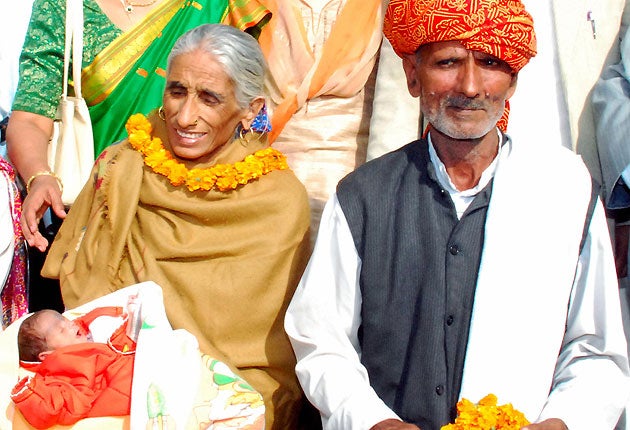The 70-year-old parents - and the mother of all rows
Ethical questions raised as IVF gives Inidan couple their first child after 55 years of trying

Your support helps us to tell the story
From reproductive rights to climate change to Big Tech, The Independent is on the ground when the story is developing. Whether it's investigating the financials of Elon Musk's pro-Trump PAC or producing our latest documentary, 'The A Word', which shines a light on the American women fighting for reproductive rights, we know how important it is to parse out the facts from the messaging.
At such a critical moment in US history, we need reporters on the ground. Your donation allows us to keep sending journalists to speak to both sides of the story.
The Independent is trusted by Americans across the entire political spectrum. And unlike many other quality news outlets, we choose not to lock Americans out of our reporting and analysis with paywalls. We believe quality journalism should be available to everyone, paid for by those who can afford it.
Your support makes all the difference.For more than half a century, Rajo Devi and her husband dreamt of having a child.
Such was the desperation of her husband for an heir that 10 years into their marriage, he even married Mrs Devi's sister in an effort to produce offspring. Even that odd, unlikely measure failed to pay off and he and his wife (or wives) gradually accepted they would live their lives without children.
Then last year, with both aged about 70 and married for 55 years, Mrs Devi and her husband, Bala Ram, learnt through neighbours of a news story about a 58-year-old woman who had given birth to twins after in vitro fertilisation treatment. They decided they too would do the same. That was nine months ago.
Now Mrs Devi has become what her doctor believes is the world's oldest mother. Late last month, she gave birth to her first child. Delivered by Caesarean section on 28 November, the little girl and her proud mother are said to be in good health. On the telephone from her home in northern Haryana state, Mrs Devi told reporters: "I'm happy. The baby is doing well."
But however happy Mrs Devi and her husband may be with their daughter, the event will trigger fresh debate about the wisdom of giving birth at such an advanced age. Is it good for the parents, is it good for the child? Is there a different standard applied to elderly mothers as opposed to creaking fathers?
It will also focus fresh attention on regulations in India, to where a growing number of couples have turned for in vitro fertilisation treatment because of the lax laws controlling such matters.
Dr Anurag Bishnoi of the so-called National Fertility Centre, a private facility in the town of Hisar, said that Mrs Devi and her husband, a farmer, came into the clinic for treatment. The embryo transfer was performed on 19 April. Mr Bishnoi told The Times of India: "More than 15 per cent of the Indian population is facing infertility problems. There are 200 IVF centres in the country and general awareness is
growing among couples. IVF has revolutionised the way we look at infertility. Infertility is no longer a social taboo or a divine curse. It can be treated scientifically."
It is impossible to confirm whether Mrs Devi is the oldest woman to have given birth because, typically enough in rural India, she has no birth certificate. She told doctors that she believed she was about 70 and her husband said he believes he is 72.
In 2006, Carmela Bousada of Spain, became what was believed to be the oldest new mother when she had twin boys at age 66. Before that, Adriana Iliescu, of Romania, gave birth to a girl in 2005. Ms Bousada was 130 days older than Ms Iliescu.
Asked whether the septuagenarians were prepared to raise a new baby, one relative replied: "They should not worry about bringing up their daughter; we have a joint family and there are countless people to take care of her."
Join our commenting forum
Join thought-provoking conversations, follow other Independent readers and see their replies
Comments